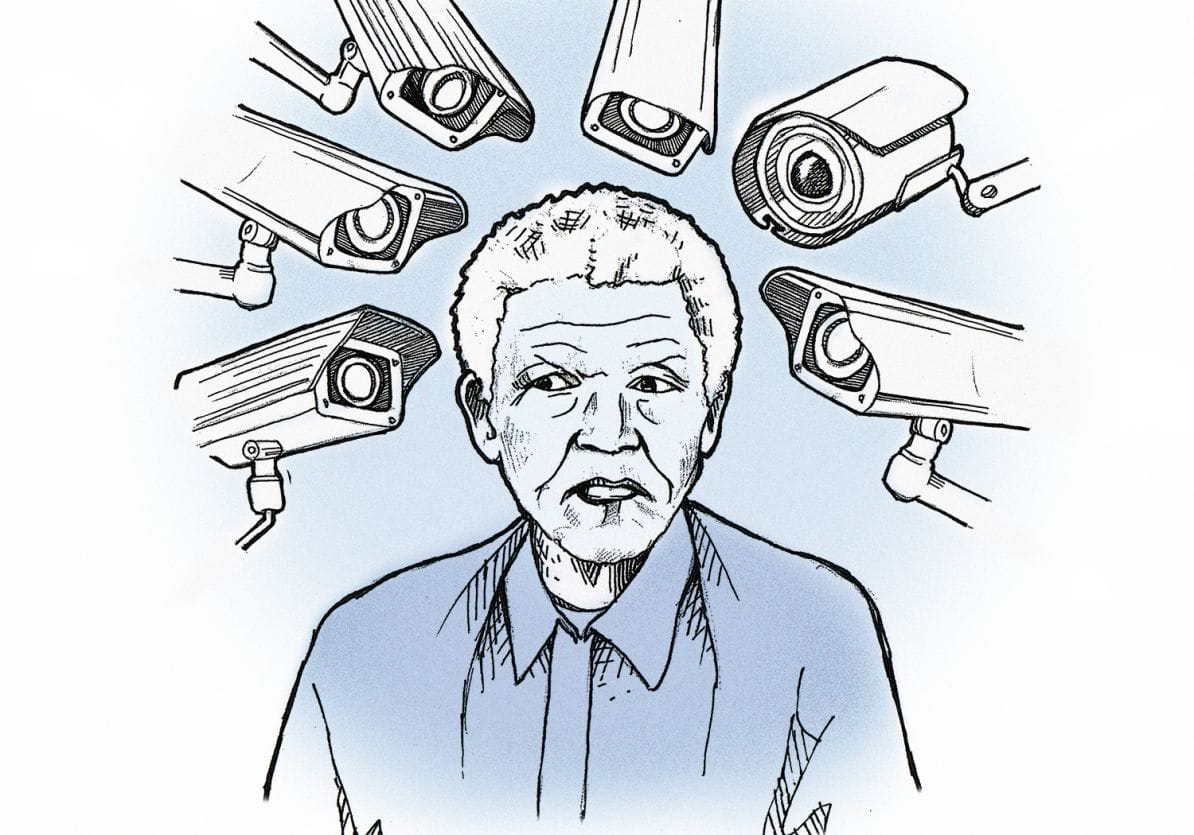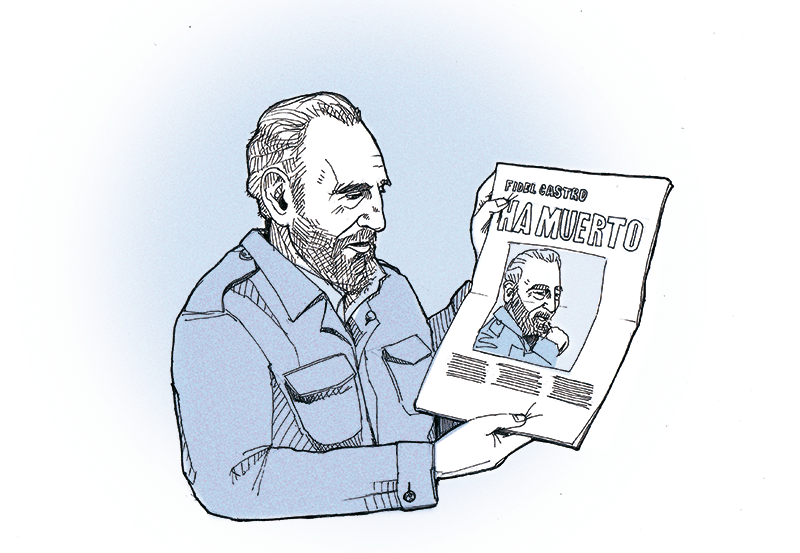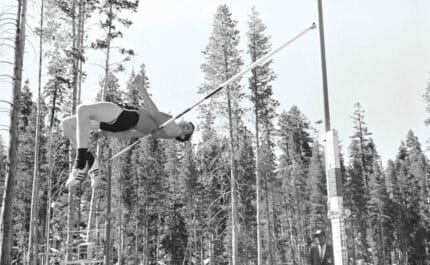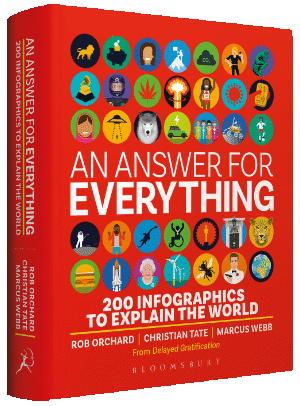Breaking bad
When two press agencies were caught out on a Mandela deathwatch in December 2011, Alan Rutter looked into the murky world of pre-emptive news reporting

Illustrations: Vanessa Arnaud
15th December 2011 (Taken from: #5)
When the South African Times reported that Reuters and Associated Press (AP) had set up CCTV trained on the house of Nelson Mandela, anticipating the revered man’s death, there was outrage across the nation. Chieftainess Nokwanele Balizulu, who lives opposite Mandela’s house in Qunu, Eastern Cape province, had given permission for the cameras to be installed – but nevertheless the actions (which prompted a police investigation) were an afront to South African attitudes to death, and raised many questions about the ethics of such a vulture-like media deathwatch.
The news agencies were unapologetic. “They are not surveillance cameras,” said AP spokesperson Paul Colford. “Along with other media, the AP has preparedness around Mr Mandela’s eventual passing. The AP cameras were not switched on and would only be used in the event of a major news story involving the former president. We had similar preparedness outside the Vatican ahead of Pope John Paul II’s passing.” One could argue that since Mandela’s eventual death is inevitable, the agencies have a responsibility to be ready to cover what will be a major news event.
The death of Michael Jackson in June 2009 wasn’t broken by one of the big news agencies, but by celebrity gossip site TMZ.com”
And the pressure to be first in the reporting of news is greater than ever. News agencies – referred to as ‘the wires’ by other news organisations that subscribe to their feeds and often barely rework their stories for publication or broadcast – rely on their ability to break stories to survive, and with vast networks of local journalists and stringers across the globe, they have dominated in their field for more than a century (AP was formed as a news cooperative in 1846). But the digital age has brought with it new competition, from start-up news businesses to the personal reporting tools like Twitter that can turn anybody into a reporter.
The death of Michael Jackson in June 2009 wasn’t broken by one of the big news agencies or organisations, but by celebrity gossip site TMZ.com (launched in December 2005 by Time Warner). Jackson died at 2.26pm Los Angeles time – TMZ posted the news at 2.44pm. Little over an hour after Amy Winehouse had died, she trended on Twitter to the extent that she was the subject of nearly 10 per cent of all tweets worldwide – 20 million people talking about her, before a single news organisation had managed to publish or broadcast a ‘breaking news’ snippet.
In the face of this competition, it’s inevitable that the old-school agencies would want to prepare as much as possible for predictable events – leveraging their ability to provide depth of information, rather than just competing on speed. And since taxes are rarely juicy news, death (particularly of the elderly or unwell) is the other inevitability that can be pre-emptively researched. It’s accepted that obituaries are prepared in advance, as it’s unusual for anybody to do something in their last few days that renders the facts of their life up to that point redundant. Nevertheless, it can be embarrassing if this preparation is published early – as in 2003, when CNN inadvertedly posted to its website draft obituaries for seven major world figures (including Mandela, Fidel Castro, Ronald Reagan, Bob Hope and – rather unfairly, since he was only 62 and the serving vice president – Dick Cheney).
Where news organisations attempt to get ahead on less predictable news stories they’re playing an even more dangerous game. Elections are a case in point. In October last year the Irish broadcaster RTE accidentally published the ‘results’ of that country’s presidential elections before the polls had even closed.
Hedging bets with advertising is also a risk. In June last year, the Miami Herald ran a full-page advert from Macy’s congratulating LeBron James, Dwayne Wade and the rest of Miami Heat on winning the NBA championship. Only they didn’t – they were beaten by the Dallas Mavericks.
Even in the world of manufactured news and PR spin, mistakes are made. It’s fair to assume that the monster machine that is ‘The X-Factor’ would have tight control over information flow, but the 2011 run of the show in the UK was tripped up at least twice. In November, Scottish broadcaster STV posted the story of Amelia Lily winning the phone vote before voting had ended (they had prepared a story for each contestant, and pressed ‘Publish’ too early). And in December the same contestant’s ‘Winner’s Single’ was available for sale on the HMV website while the voting lines were still open (a ‘technical hitch’ was blamed, and Lily did not win).
Perhaps the most heinous example of jumping the gun came in the reporting on the Amanda Knox appeal trial in Italy in October. Thanks to a problem of mistranslation, several news organisations (including Sky and The Guardian) began reporting on a ‘guilty’ verdict, before realising that the judge had actually found her guilty of slander but – crucially – innocent of murder. The Daily Mail was the most vilified culprit, not just because it splashed the guilty verdict on its (very well read) website, but that it also including live reaction from the courtroom (‘Knox looks stunned as appeal against murder conviction is rejected’) that could only be fabricated in advance.
The paper span a whole colourful story around the incorrectly-reported verdict. “As Knox realised the enormity of what judge Hellman was saying she sank into her chair sobbing uncontrollably while her family and friends hugged each other in tears,” it reported. “A few feet away Meredith’s mother Arline, her sister Stephanie and brother Lyle, who had flown in especially for the verdict, remained expressionless, staring straight ahead, glancing over just once at the distraught Knox family. Prosecutors were delighted with the verdict and said that ‘justice has been done’ although they said on a ‘human factor it was sad two young people would be spending years in jail’.”
So, what’s changed? These, and countless other examples of incorrect ‘pre-emptive reporting’ wouldn’t be happening unless the rewards for being first were starting to outweigh the risks of being wrong. Online, the prevailing attitude is to publish as early as possible, and then add and amend as new information becomes available. For individuals on Twitter, or niche blogging sites, there is little downside – if the news turns out to be wrong, it gets forgotten. The traditional, mainstream organisations feel shackled by their own reputations for accuracy, and the threat of litigation (suing a newspaper is far more lucrative than attempting to sue a blogger) – but they nevertheless feel the need to compete.
And this is competition for hard cash, not simply bragging rights. Google doesn’t discriminate between sources based on tradition or reputation – as TMZ has proved with the Michael Jackson story and numerous other scoops, being first (and frequently, therefore, linked to by the most number of other websites) means a top slot on the search engine rankings for the story, which in turn means lucrative advertising revenue.
Draft obituaries were posted for seven major world figures including Fidel Castro and Bob Hope”
The mathematics of user behaviour on Google (with an estimated 79 per cent dominance of the global search engine market) are unforgiving. According to a 2011 Optify study, 58.4 per cent of users click one of the top three search results in Google. Beyond the first page of results, clicks drop off a cliff. Google can contribute anywhere between a third and two thirds of traffic to a given news site. Traffic means ‘clicks’, which means ad money. So, particularly if you’re praying that online revenue is going to offset falling ad revenue and readership in print, it’s suddenly clear why a news organisation wants to be first more than ever before.
On top of that, there’s the fact that nobody necessarily notices if you pre-empt the news and turn out to be right. If the CCTV cameras installed by AP and Reuters had remained undiscovered, nobody would question the fact that they had live, on-the-ground images of a major news story. The Daily Mail, who made up the court-room reactions, might have got away with it if they’d guessed correctly (if Knox had been guilty, it’s highly likely that she would have looked ‘stunned’).
But the repercussions of pre-emptive news reporting could be profound. In physics, the ‘observer effect’ refers to changes that the act of observing makes on the phenomenon being observed. In the case of voting – whether for a president or a wannabe popstar – it’s easy to see how reporting results before all votes are cast could change the end result. In legal cases, contempt of court aside, the effects could potentially lead to the collapse of prosecutions or the swaying of juries. And what happens if reputable and trusted news agencies, seeking to be first to the punch, publish incorrect reports about civil disturbances, or natural disasters?
As the effects of the Leveson enquiry are felt across the UK media landscape and beyond, news reporters are under more scrutiny than ever. Accusations are frequently levelled over their power to influence rather than report on world events – whether that’s the Murdoch empire’s influence over politics, or BBC business editor Robert Peston’s reports on the global economic downturn which some said became a self-fulfilling prophecy. In the forgettable James Bond film ‘Tomorrow Never Dies’, Jonathan Pryce has a scenery-chewing role at Elliot Carver – the villain-cum-media-supermogul who attempts to engineer a war just so his news organisations can have the exclusive, with ready-prepared newspaper front pages for atrocities he’s about to organise. Perhaps this is where we’re heading?
There have broadly been two approaches to dealing with the problematic pre-emptive news phenomenon on the part of news organisations. The first is to join the digital barbarian hordes – reporting leads, verified or otherwise, as they emerge, being honest where there is doubt, and building the story in public view. This is the route espoused by digital journalism evangelists like Jeff Jarvis (director of the Tow-Knight Center for Entrepreneurial Journalism at the City University of New York) and Clay Shirky (author of ‘Here Comes Everyone’ and a professor at New York University). It requires traditional news organisations and reporters to loosen their grip on one of the fundamental sources of authority – accuracy, always – and break down the walls between news producers and consumers. This collaborative journalism – “this is what we know, what do you know?” – attempts to tap into the vast nervous system of amateur journalists using social media tools, rather than compete with it. The process of investigating and reporting on news events is effectively made public – the conversations that previously took place behind closed doors in newsrooms that took an event from initial lead to published story are now expected to happen openly.
The second approach is to cede ground on the battle for being first to report the news, and focus instead on other strengths that traditional newsrooms and professional journalists possess: the ability to add depth, context and analysis. The Guardian and Observer – long applauded for their forward-thinking digital output, while at the same time haemorrhaging cash – announced in June last year that they would adopt a ‘digital first’ strategy, in part to cope with the losses they were sustaining. While for the Guardian website this would likely mean the in plain view approach, for the newspaper this explicitly means a printed newspaper that focuses less on breaking news and more on analysis. As editor Alan Rusbridger put it, “Newsnight not News at Ten”. (It’s worth noting that the publication you’re reading was founded on a similar principle.)
Those two approaches are not by any means mutually exclusive, and should be highly complementary. But they do require news organisations to accept an undeniable fact: that the proliferation of digital publishing tools has meant that it is often no longer possible to be first and ‘accurate’ in the fully researched, stand-up-story sense. For institutions steeped in the world of scoops and competition over breaking news, this is no small ask.
Until the shift is made, we’ll continue to read false reports from a crystal ball as the news-givers trip over themselves in the race to be first – whether on death, sports or entertaining ephemera. Remember, you heard it here first.
Slow Journalism in your inbox, plus infographics, offers and more: sign up for the free DG newsletter. Sign me up
Thanks for signing up.









